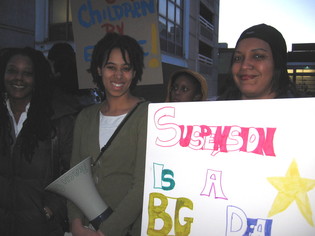 Mary McCormick’s 7th grade son these days won’t even tell her what his problems are in school. He’s afraid kids will call him “snitch.” She’s afraid that might lead to another bullying incident, then a suspension.
Mary McCormick’s 7th grade son these days won’t even tell her what his problems are in school. He’s afraid kids will call him “snitch.” She’s afraid that might lead to another bullying incident, then a suspension.
Teach Our Children, the school the parent advocacy group, of which McCormick is a member, held its first 2009 rally and press conference of the year in front of the Whalley Avenue detention center Monday evening.
Why the jail? To call attention to what is looming to be one of TOC’s major issues of 2009: a school-to-prison “pipeline,” as TOC’s organizers call it. Mishandled misbehavior results in suspensions, then dropping out, then jail, the group charged. It said that cycle “devastates the New Haven community every day.”
But first there was some good news to report.
Parent organizer Chianna Simmons (left in photo) and TOC’s new coordinator Camille Scott both said that last year’s at times contentious relationship with the Board of Ed has resulted in revisions to the suspension policy. The policy now assures all suspended students will at least have access to homework within three days.
“A new anti-bullying policy,” said Simmons, is also in the works. “Superintendent [Reggie] Mayo has assured us that teachers and principals are going to be trained, there will be posters.”
That would be good news to McCormick (pictured on the right at top). She said her son has ADHD and doesn’t often know how to respond to ribbing effectively. Sometimes he strikes out in response. He had to be transferred from the Clinton Avenue School to Ross Woodward.
“Yes, things are better there,” said McCormick, “but you know it’s not really because the teachers know how to identify the bullying yet and stop it; they don’t. Things are better because I’m at the school a lot, and the teachers are in touch with me not only about my son’s progress but problems too, trying to head them off before they start.”
Superintendent Mayo and Board of Ed officials have said that revisions of the general code of conduct for schools, a focus on dealing with bullying, and lowering suspensions numbers have been in the works for a long time. Although Mayo has said these matters take time, the BOE was prodded into quicker action by TOC’s sometimes confrontational campaigning during 2008.
One of the results, said Chianna Simmons, is a regular monthly meeting with the superintendent. At the last meeting, suspension and bullying policies were discussed, amicably and productively in her view.
According to a study done by Cambridge Associates of urban school districts in the state, New Haven did well by many measures. However, the number of suspensions, said the study, was far too high, and should be reduced.
According to a 2008 study by Connecticut Voices for Children, New Haven was in the top five districts statewide in out-of-school suspension rates, with some 17 percent of its nearly 20,000 students receiving at least one suspension.
The issue for Lamont Moye, a parent of two boys at the Celentano School, and for Cynthia Shannon (pictured) the grandmother of two kids at the Clinton Avenue School, is the number of suspensions issued for trivial causes. While it’s good that kids are finally getting homework, they shouldn’t in Shannon’s words, “be suspended for chewing gum, or slamming the door, or looking the wrong way at someone.”
Carey Ellington, an intern with TOC who lives in Newhallville, said that she sees the “pipeline” in action every day in her neighborhood. “Kids are suspended. They don’t have homework. They fall farther behind. Readjusting to school is harder and harder when they get back. They’re out again, and eventually the police pick them up.”
Ellington said that last year more than 3,300 kids were suspended, with some 846 from Ross Woodward alone. A call to the BOE to confirm these numbers was not returned by press time.
According to Moye, the new suspension policy requiring that kids receive all their homework within three days was implemented only last month. “We don’t know if it’s working,” he said, “but we plan to monitor it.”
The abolition of out-of-school suspension in favor of in-school suspension, in which students could be sure to do their work but in a monitored study-hall or detention setting, was slated to become legislation this year. However, given the financial meltdown, Governor M. Rell appears to be hoping to roll back that effort.
Mayo has said for years that in-school suspension, except for serious violations such as carrying a weapon, is preferable. But he said that staff is required and that without support it would be an unfunded mandate.
Social justice advocate Barbara Fair (pictured on the right), who spoke at the rally, said, “For forty years the corrections budget in Connecticut has gone up. It’s not touched in this year’s budget either. Don’t let people tell you there is no funding for in-school suspension. Let’s get our priorities right.
“Take it from corrections and put it in the schools, so we prepare kids to be citizens, not prisoners.”
In addition to monitoring the suspension and bullying policies, TOC’s 2009 agenda includes continuing to bring pressure for the NHPS to include citywide recess for kids and translation into Spanish on the evolving BOE website and at all BOE meetings.
In the meantime, down in the trenches of 7th grade life, parent Mary McCormick is in her son’s school at least twice a week. “I want to be sure the teachers know me,” she said.